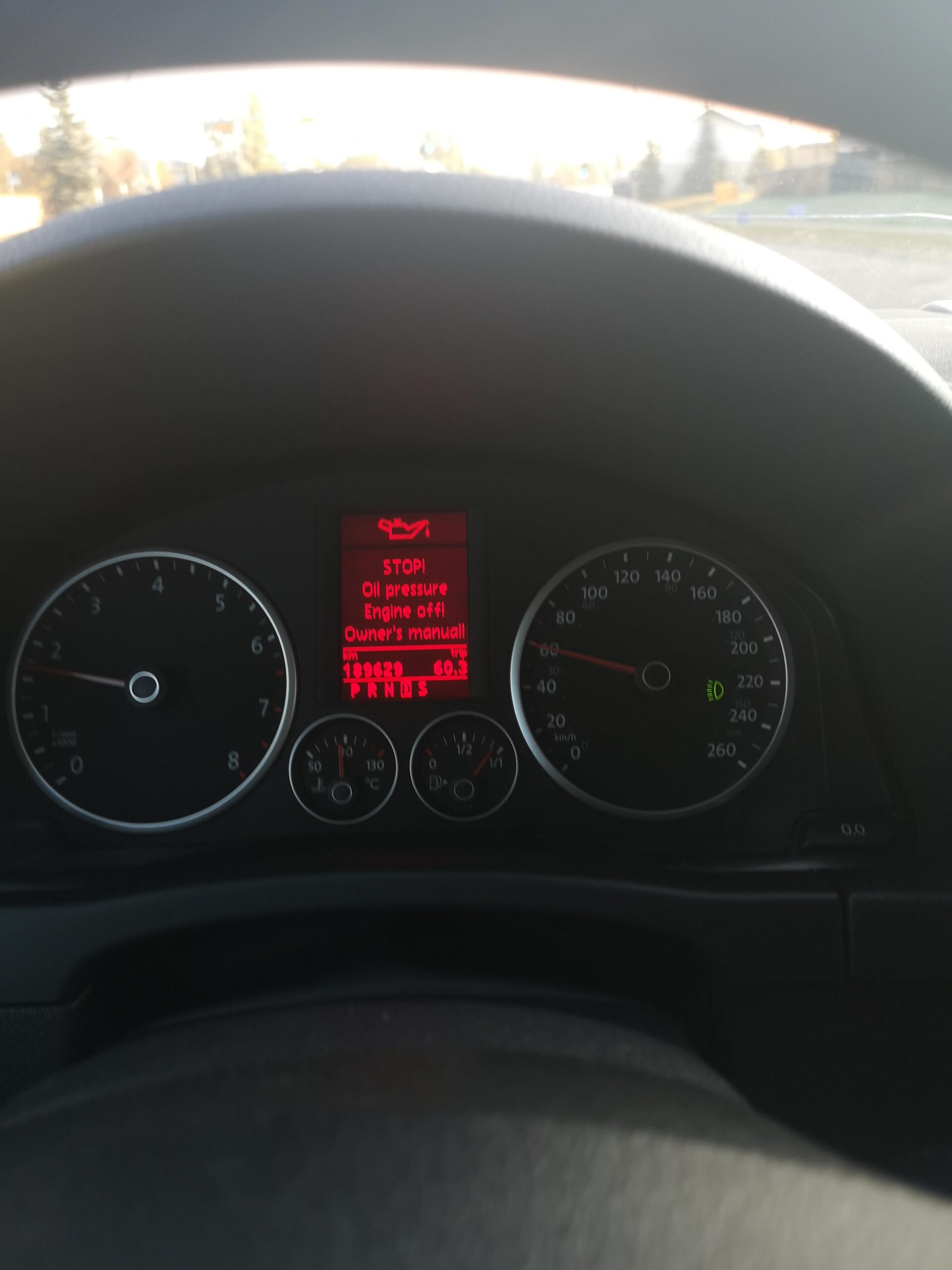Imagine cruising down the road in your Volkswagen when suddenly, the “oil pressure engine off” message lights up on your dashboard.
What’s the next move?
First off, stay calm because we’ve got your back.
Dealing with low oil pressure is something that can happen to any car, no matter the make or model.
The most crucial thing to do is pull over and stop your car.
Once you’ve safely parked, check out this straightforward guide to help you through the situation.
Delve into the steps to understand what’s happening and figure out what you need to do.
We’re here to prioritize your peace of mind and make sure your Volkswagen keeps running smoothly.
Let’s break down the process together, addressing the challenge and keeping your car’s engine in top shape.
What Is The Meaning Of ‘Oil Pressure Engine Off’ Message on VW?
When your VW shows the “Oil Pressure Engine Off” message, it’s telling you something’s up with the engine’s oil pressure. This could be because the oil levels are low, the oil pressure sensor is acting wonky, the oil filter is clogged, the oil pump is on the fritz, there’s an oil leak, or some other glitch.
If the oil pressure dips too low, it’s bad news for your engine parts like bearings, and it might even lead to the whole engine calling it quits. To dodge that disaster, don’t waste time – first, check the oil level. But don’t stop there; for a fix that sticks, get a pro from a service or repair shop to take a look. Quick action not only saves your engine but keeps your VW running smooth for the long haul.
Also Read: Rubbing Noise From Front Wheel When Driving Slow: Here Is Why
What Are the Common Causes Of “Oil Pressure Engine Off” Warning On VW?
Volkswagen vehicles come equipped with an advanced oil pressure warning system designed to notify drivers of potential issues with the engine’s oil pressure. The dashboard illuminates the “Oil Pressure Engine Off” warning light to signal this concern. This section will delve into various factors that could trigger this warning and explore them in detail.
1: Low oil level could be a culprit.
A simple yet essential step involves inspecting the engine oil dipstick to gauge the oil level. If it falls below the minimum threshold, it might be the cause behind the “oil pressure engine off” warning. Occasionally, factors like leaks or the aging of your vehicle can lead to falsely indicating low oil levels even after a recent refill. Therefore, it’s recommended to verify the oil level using the dipstick for accurate assessment.
2: Sump Screen Blockage
Another factor that could lead to the problem is a blocked sump screen. When the fluid tube gauze filter is obstructed, the tube becomes incapable of drawing in any fluid. To assess whether the tube gauze is blocked, consider lowering the oil pan and examining if it hampers the mesh screen. If the tube fails to extract an adequate amount of oil, it will struggle to build the necessary pressure.
3: Widened bearing clearances resulting from bearing failure
As your vehicle ages, it’s natural for components to encounter issues. If you suspect a faulty bearing, there’s an 80% likelihood of encountering increased bearing clearances. While it’s generally not recommended to attempt self-diagnosis, those with basic knowledge may identify the issue, depending on their car model. To assess whether it’s a task you can undertake yourself, consult your car’s factory service manual for DIY feasibility.
Handling ‘Oil Pressure Engine Off’ in Your VW: A Step-by-Step Guide
Step 1- Immediate Shutdown
- The first crucial step when confronted with the ‘Oil Pressure Engine Off’ warning in your Volkswagen is to turn off the vehicle and refrain from restarting it.
Step 2 – Check Oil Level
- After shutting down, assess your oil level. Two scenarios may unfold:
- If the level is within the acceptable range, you might think you’re in the clear. However, don’t underestimate the gravity of the ‘Oil Pressure Engine Off’ situation in your VW.
- Never attempt to restart the car. Instead, contact road assistance promptly for professional support.
Step 3 – Consult Owner’s Manual or Professional Service
- In cases of insufficient oil, consult your VW’s ‘Oil Pressure Engine Off’ owner’s manual or seek guidance from a professional service. Follow their instructions to add the correct amount of fluid to reach the optimal level.
Step 4 – Restart with Caution
- Once you’ve added the required fluid, follow the prescribed instructions in the manual or from the professional service. Start your car and let it run for five seconds.
Step 5 – Monitor Warning Light
- While the engine is running, keep a vigilant eye on the warning light. If it remains off after five seconds, it’s a positive sign, and you can proceed with your journey.
Step 6 – Persistent Warning
- If the warning light persists, avoid attempting to drive further. Instead, contact road assistance, provide details about the ‘Oil Pressure Engine Off’ situation in your VW, and await their assistance.
Examining Oil Pressure Levels in Your VW CC: A Comprehensive Guide

Step 1: Identify and Disconnect
Locate the oil pressure sensor switch. Disconnect the electrical connector and remove the sensor using an appropriate socket.
Step 2: Gauge Connection
Attach a mechanical or manual gauge to the designated port. Ensure the gauges have the correct thread sizes for a secure fit.
Step 3: Engine Activation and Reading
Start your car and observe the gauge reading. If the result falls below the manufacturer’s specified level, promptly turn off your vehicle.
Step 4: Vigilance and Professional Input
During the process, stay alert to any potential signs. While it’s encouraged to utilize tools within your skill set for preliminary diagnosis, it’s not recommended in all situations. If you suspect an overload or encounter uncertainties, seek professional advice promptly.
This step-by-step approach empowers you to assess the oil pressure level in your VW CC. Regular monitoring and timely professional intervention contribute to the overall health and performance of your vehicle.
Can You Drive A VW With “Oil Pressure Engine Off” Warning?
Driving a VW with an “Oil Pressure Engine Off” warning is strongly discouraged. This alert signals potential problems with engine oil levels or pressure, posing a risk of significant engine damage if neglected. Possible triggers include a malfunctioning oil pressure sensor, oil pump issues, a clogged oil filter, or an oil leak.
To address this, it is crucial to promptly service the vehicle, identifying the underlying cause of the warning and rectifying any issues. Continuing to operate the vehicle with low oil pressure may result in a further drop in pressure or oil levels, leading to damage to engine bearings and other serious engine complications.
For effective resolution, it is advisable to seek assistance from authorized repair shops or professional service centers, ensuring timely and expert attention to automotive issues.
FAQs – Oil Pressure Engine Off VW
How does the engine oil light function?
The sensor activates this light both directly and indirectly. Pressurized liquid circulates through various components to cool the motor, lubricate bearings, and engage oil-loaded components.
What happens if the sensor detects a drop in oil pressure?
If the sensor senses a drop, the engine’s computer triggers the warning light and may even shut down the motor.
If the Engine Oil Light turns off after 5 seconds, what does it signify?
If the light goes off after refilling the oil within five seconds, your issue is likely resolved, and it’s safe to continue driving. However, be aware that oil replacement doesn’t guarantee immunity from future occurrences of the VW Tiguan oil pressure engine off problem. Seeking professional diagnosis for potential hidden issues is advisable.
Can low oil pressure lock up the engine?
Yes, low oil pressure can lead to the Volkswagen oil pressure engine off and potentially lock up your vehicle. The risk of the starting motor seizing is high, so it’s wise to turn off your car until you identify the exact cause.
How do you improve oil pressure?
Improving oil pressure involves addressing potential causes such as checking and replenishing oil levels, inspecting for leaks, and ensuring the proper functioning of components like the oil pump and pressure sensor.
How do I know if my oil pump or sensor is bad?
Signs of a bad oil pump or sensor include low oil pressure, engine overheating, or unusual noises. Professional diagnosis is recommended for accurate assessment.
How do you diagnose oil pressure problems?
Diagnosing oil pressure problems entails using a mechanical gauge to measure pressure, checking for leaks, inspecting the oil filter, and ensuring proper oil viscosity.
Can the oil filter affect oil pressure?
Yes, a clogged or faulty oil filter can impede oil flow, leading to reduced oil pressure. Regularly changing the oil filter is crucial for maintaining optimal oil pressure.
Will thicker oil fix oil pressure?
Using thicker oil may temporarily increase oil pressure, but it’s essential to adhere to the manufacturer’s recommendations. Consult a professional for guidance on suitable oil viscosity for your vehicle.
Can a bad fuel pump cause low oil pressure?
While a bad fuel pump doesn’t directly affect oil pressure, it’s essential to address any malfunctions promptly to prevent potential engine issues.
Why is my oil light on but my oil is full?
An illuminated oil light with a full oil level may indicate a faulty oil pressure sensor, wiring issues, or other underlying problems. Professional inspection is recommended.
How do you check engine oil pressure?
Checking engine oil pressure involves using a mechanical gauge to measure the pressure. Seek professional assistance for an accurate assessment.
Conclusion – Oil Pressure Engine Off VW
We’ve walked you through effectively managing the “oil pressure engine off” scenario for your VG vehicle.
While this guide encompasses all the vital details, should any lingering doubts persist, drop a comment below, and our experts will promptly assist you. Furthermore, to avert potential complications, if DIY seems challenging, don’t hesitate to opt for professional assistance.
Your vehicle’s well-being is paramount, and seeking expert help ensures a smooth resolution without risking further issues.


![[SOLVED] Why Is My Forward Camera System Unavailable?](https://carfixexperts.com/wp-content/uploads/2023/12/195D64C6-14B5-4F31-A6D6-EBF321794390_1533617612184.webp)

